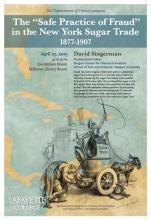
Sugar lay at the center of U.S. political economy in the late 19th century. Its consumption was high and rising, refiners were a powerful industry, and sugar tariffs made up 1/6th of the Federal government’s entire revenue. But as Caribbean production moved to new industrial factories, and as slave and free labor in those factories came under chemical surveillance, the qualities of the sugar entering U.S. ports challenged existing understandings of the relationship between purity and value. To allay fears of widespread fraud in the customs house—already the subject of massive corruption scandals—the Treasury adopted what it hoped were objective techniques of scientific measurement. But in searching for a less corruptible tariff, the government found itself beholden to the unaccountable expertise of its own agents: samplers, appraisers, and chemists could slip between spaces of state and commercial authority, exploiting that mobility to their own advantage even as it made them attractive targets for influence by moneyed interests. The country’s largest refiners used the ambiguities of scientific knowledge to their own ends, siphoning state revenue and forcing competitors to join the notorious cartel that became known as the Sugar Trust.


